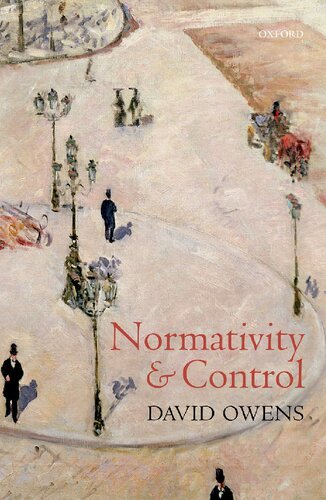

Most ebook files are in PDF format, so you can easily read them using various software such as Foxit Reader or directly on the Google Chrome browser.
Some ebook files are released by publishers in other formats such as .awz, .mobi, .epub, .fb2, etc. You may need to install specific software to read these formats on mobile/PC, such as Calibre.
Please read the tutorial at this link. https://ebooknice.com/page/post?id=faq
We offer FREE conversion to the popular formats you request; however, this may take some time. Therefore, right after payment, please email us, and we will try to provide the service as quickly as possible.
For some exceptional file formats or broken links (if any), please refrain from opening any disputes. Instead, email us first, and we will try to assist within a maximum of 6 hours.
EbookNice Team

Status:
Available5.0
18 reviews
ISBN 10: 0198713231
ISBN 13: 9780198713234
Author: David Owens
Do we control what we believe? Are we responsible for what we believe? These two questions are connected: the kind of responsibility we have for our beliefs depends on the form of control that we have over them. For a number of years David Owens has investigated what form of control we must have over something in order to be held to the norms governing that thing, and has argued that belief, intention and action each require a different type of control. The forms of freedom appropriate to each of them vary, and so do the presuppositions of responsibility associated with each of them. Issues in the moral psychology of belief cast light on some of the traditional problems of epistemology and in particular on the problems of scepticism and testimony. In this series of ten essays Owens explores various different forms of control we might have over belief and the different forms of responsibility they generate. He brings into the picture notable recent work in epistemology: on assurance theories of testimony, on 'pragmatic encroachment', on the aim of belief and on the value of knowledge. He also considers topics in related fields such as the philosophy of mind (e.g. the problem of self-knowledge and theories of the first person) and the philosophy of action (e.g. the guise of the good and the role of the will in free agency). Finally, Owens suggests a non-standard reading of the sceptical tradition in early modern philosophy as we find it in Descartes and Hume. Seven of the essays collected here are previously published, one has been heavily revised, and two are previously unpublished. Owens provides a substantial introduction bringing together the themes of the essays.
Part I. Normativity: Epistemic and Practical
1. Epistemic Akrasia
1.1 The Judgement Condition: Moore’s Paradox
1.2 The Judgement Condition: Transparency
1.3 The Control Condition: Evidential Akrasia
1.4 The Control Condition: Epistemic Akrasia
2. Does Belief Have an Aim?
2.1 Truth as the Aim of Belief
2.2 Believing and Guessing: Rationality
2.3 Believing and Guessing: Control
2.4 Conclusion
3. Deliberation and the First Person
3.1 What is Deliberation?
3.2 Practical and Theoretical Deliberation
3.3 Reflective Maintenance: Shoemaker
3.4 Reflective Reasoning: Burge
3.5 Reflective Deliberation
3.6 Conclusion
4. Value and Epistemic Normativity
4.1 The Bayesian Challenge
4.2 Alethic Conceptions of Belief
4.3 Pragmatic Conceptions of Belief
4.4 Belief and the Passions
4.5 Epistemic Norms and Normative Interests
Part II. Scepticism
5. Scepticisms: Descartes and Hume
5.1 Cartesian Scepticism
5.2 Humean Scepticism
5.3 Descartes, Freedom, and Certainty
6. Descartes’ Use of Doubt
6.1 The Role of Reflection
6.2 The Need for Certainty
6.3 Descartes’ Conjectures
6.4 Descartes’ Suppositions
Part III. Practical Freedom
7. Freedom and Practical Judgement
7.1 What is Practical Judgement?
7.2 Judgement and Ignorance
7.3 Judgement and Knowledge
7.4 Practical Freedom
8. Habitual Agency
8.1 Acting from Habit
8.2 The Guise of the Good
8.3 Habits and Policies
8.4 Habits and Virtues
Part IV. Testimony
9. Testimony and Assertion
9.1 Expressing and Indicating Belief
9.2 Assertion as Expression
9.3 Assertion as Assurance
9.4 Testimony
9.5 Conclusion
10. Human Testimony
10.1 The Rational Entitlement Model of Testimony
10.2 The Inheritance Model of Testimony
10.3 Objections and Clarifications
10.4 Assertion and Assurance
Bibliography
david owens normativity and control
norman brown and-control
david z. norton
owen 2014
theory owens
robert owens book
Tags: David Owens, Normativity, Control